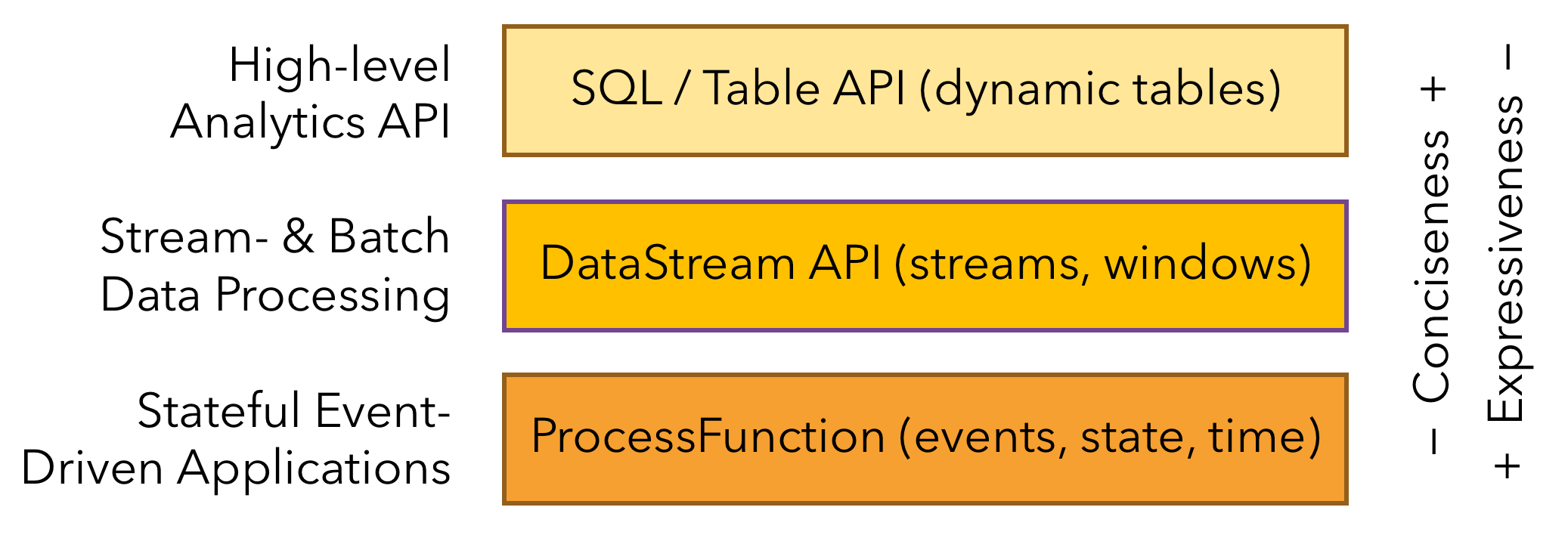What is Apache Flink?
Apache Flink is a framework and distributed processing engine for stateful computations over unbounded and bounded data streams. Flink has been designed to run in all common cluster environments, perform computations at in-memory speed and at any scale.

Unbounded and Bounded Streams
Apache Flink supports both unbounded and bounded streams:
Unbounded streams have a start but no defined end. They do not terminate and provide data as it is generated.
Bounded streams have a defined start and end. Bounded streams can be processed by ingesting all data before performing any computations. Processing of bounded streams is also known as batch processing.

Deploy Applications Anywhere
Apache Flink is a distributed system and requires compute resources in order to execute applications.
Flink integrates with all common cluster resource managers such as Hadoop YARN, Apache Mesos, and Kubernetes.
It can also be setup to run as a stand-alone cluster.
Run Applications at any Scale
Flink is designed to run stateful streaming applications at any scale.
Applications are parallelized into possibly thousands of tasks that are distributed and concurrently executed in a cluster.
A Flink application can leverage virtually unlimited amounts of CPUs, main memory, disk and network IO.
Leverage In-Memory Performance
Stateful Flink applications are optimized for local state access.
Task state is always maintained in memory.
If the state size exceeds the available memory, it is maintained in access-efficient on-disk data structures.

Layered APIs in Apache Flink
Flink provides three layered APIs. Each API offers a different trade-off between conciseness and expressiveness and targets different use cases.

Libraries in Apache Flink
Flink features several libraries for common data processing use cases. The libraries are typically embedded in an API and not fully self-contained. Hence, they can benefit from all features of the API and be integrated with other libraries.
Complex Event Processing (CEP): Flink’s CEP library provides an API to specify patterns of events.
DataSet API: The DataSet API is Flink’s core API for batch processing applications.
Gelly: Gelly is a library for scalable graph processing and analysis.
Complex Event Processing (CEP)
Pattern detection is a very common use case for event stream processing.
Flink’s CEP library provides an API to specify patterns of events (think of regular expressions or state machines).
The CEP library is integrated with Flink’s DataStream API, such that patterns are evaluated on DataStreams.
Applications for the CEP library include network intrusion detection, business process monitoring, and fraud detection.
DataSet API
The DataSet API is Flink’s core API for batch processing applications.
The primitives of the DataSet API include map, reduce, (outer) join, co-group, and iterate.
All operations are backed by algorithms and data structures that operate on serialized data in memory.
These operations spill to disk if the data size exceed the memory budget.
Algorithms of Flink’s DataSet API are based on database operators, like hybrid hash-join or external merge-sort.
Gelly Library
Gelly is a library for scalable graph processing and analysis.
Gelly is implemented on top of and integrated with the DataSet API.
Gelly benefits from its scalable and robust operators.
Gelly features built-in algorithms, such as label propagation, triangle enumeration, and page ran.
Gelly provides a Graph API that eases the implementation of custom graph algorithms.
SQL & Table API
Flink features two relational APIs, the Table API and SQL.
Both APIs are unified APIs for batch and stream processing.
Queries are executed with the same semantics on unbounded, real-time streams or bounded, recorded streams and produce the same results.
The Table API and SQL leverage Apache Calcite for parsing, validation, and query optimization.
Run Flink Applications 24X7
Flink provides following features to ensure that applications keep running, and remain consistent:
Consistent Checkpoints
Efficient Checkpoints
End-to-End Exactly-Once
Integration with Cluster Managers
High-Availability Setup
Consistent Checkpoints
Flink’s recovery mechanism is based on consistent checkpoints of an application’s state.
In case of a failure, the application is restarted and its state is loaded from the latest checkpoint.
In combination with resettable stream sources, this feature can guarantee exactly-once state consistency.
Efficient Checkpoints
Checkpointing the state of an application can be quite expensive if the application maintains terabytes of state.
Flink can perform asynchronous and incremental checkpoints.
It can keep the impact of checkpoints on the application’s latency SLAs very small.
End-to-End Exactly-Once
Flink features transactional sinks for specific storage systems that guarantee that data is only written out exactly once, even in case of failures.
Integration with Cluster Managers
Flink is tightly integrated with cluster managers, such as Hadoop YARN, Mesos, or Kubernetes.
When a process fails, a new process is automatically started to take over its work.
High-Availability Setup
Flink features a high-availability mode that eliminates all single-points-of-failure.
The HA-mode is based on Apache ZooKeeper, a battle-proven service for reliable distributed coordination.
Savepoints in Flink
Savepoint solves the issue of updating stateful applications and many other challenges.
A savepoint is a consistent snapshot of an application’s state.
Savepoint is very similar to a checkpoint.
Savepoint needs to be manually triggered and is not automatically removed when an application is stopped.
Benefits of Savepoints
Savepoints enable following features:
Application Evolution
Cluster Migration
Flink Version Updates
Application Scaling
A/B Tests and What-If Scenarios
Pause and Resume
Archiving
Flink Monitoring
Flink integrates nicely with many common logging and monitoring services, and provides a REST API to control applications and query information.
Web UI
Logging
Metrics
REST API
Further Sources
Refer official documents on Apache Flink here:
Flink Documentation: https://flink.apache.org/
Flink Blog: https://flink.apache.org/blog/